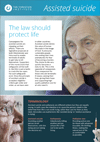The majority of doctors who support scrapping end-of-life protections for the terminally ill are least involved in their care, a bioethicist has argued.
Dr Mehmet Ciftci said recent polls on assisted suicide reveal a significant difference in attitude toward the controversial practice between general practitioners and those who specialise in palliative medicine.
Writing in The Times, the Fellow of Public Bioethics at Anscombe Bioethics Centre said that legislators should take care when considering the results of polls when deliberating a change in the law.
McArthur’s Bill
Dr Ciftci questioned the legitimacy of a poll conducted at the Association of Anaesthetists’ congress in Edinburgh last year, which claimed to show that four-fifths of anaesthetists backed ‘assisted dying’.
Cited by activists as demonstrating support among medics for Liam McArthur’s Holyrood Bill on assisted suicide, the bioethicist branded it “a straw poll”, conducted in a hostile environment, without proper debate.
“Those present raised concerns about the staged nature of it. After McArthur was given a platform for his proposals, a panel of consultants spoke who were all in favour of it or neutral.”
He concluded: “It is hard to take seriously a view that is frightened of exposing itself to criticism or forthright debate.”
Recent polls
However, he continued: “There are also many other polls that paint a very different picture of the medical profession’s opinion.” Recent polls on the issue by Doctors.net.uk and the BMA, he explained, found that “opinion was divided”.
“More importantly,” he observed, “the doctors who are most in favour are least involved with caring for terminally ill patients in the long term. That, instead, tends to be the role of those in palliative medicine, oncologists and GPs, all of whom often express a strong opposition.
“Fifty-two per cent of GPs and 73 per cent of palliative care doctors who responded to the Doctors.net.uk poll were opposed to physician-assisted dying.
“The BMA similarly found the specialisms most likely to oppose it were palliative medicine, oncology, and general practice. Those in palliative medicine were opposed by a clear majority.”
‘Poison’
He concluded: “We cannot ignore the undeniable opposition from those most involved in caring for the dying.
“They know very well that physician-assisted dying would poison the relationship of trust between doctor and patient, and pressure the most vulnerable to choose suicide from feeling like a burden to others.
“Polls play an important part in informing legislation. But we should consider who is responding to them and take all of them into account.”
SNP
Holyrood is expected to consider McArthur’s Assisted Dying for Terminally Ill Adults Bill in the coming months. The Liberal Democrat MSP wants to remove end-of-life protections and allow vulnerable people to seek help from a doctor to kill themselves.
In January, Scotland’s Equalities Minister Emma Roddick said that McArthur’s Bill is ‘unsafe’ for disabled people and should not become law.
Canvassed for her views, the SNP MSP told The Herald on Sunday: “I don’t see how this legislation can be safe while disabled people don’t have equality”.
Last year, Scotland’s First Minister and Health Secretary both publicly restated their opposition to legalising assisted suicide.

Widdecombe: ‘Rantzen’s campaign for assisted suicide must not prevail’
MSP: ‘Increasing numbers of Scots will die if Holyrood backs assisted suicide’
Bioethicist: ‘Legalising assisted suicide will lead to euthanasia’
Paralympic legend fears for vulnerable if end-of-life protections are removed


